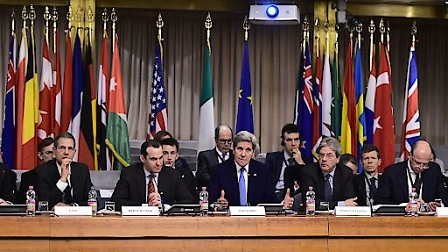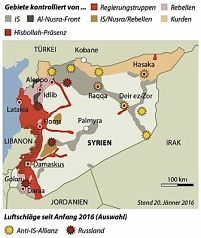Erstellt am: 2. 2. 2016 - 14:51 Uhr
Less brutal, but more dangerous
Officials from 23 countries which are part of the Global Coalition against Islamic State, or Daesh are in Rome today to discuss their strategy.

AFP/Alberto Pizzoli
However, a new report by the Institute for the Study of War and the American Enterprise Institute says the West should be much more focused on the threat from the Al Nusra Front in Syria because, in the long run, they present a more difficult, and potentially dangerous, problem.
International security analyst, Shashank Joshi gave Reality Check his insights into the group, its aims, and the threat it poses to the west.
Joanna Bostock: First of all, who are Al Nusra, and what is their role in the Syria conflict?
Shashank Joshi: The Al Nusra Front are an outgrowth of the organization which used to be called Al Qaeda in Iraq. Now, Al Qaeda in Iraq evolved into Islamic State, what we now understand as ISIS or Daesh, and another branch was sent into Syria to participate in the uprising against Bashar Al Assad after 2011, and that became Al Nusra, and so the two entities were on the same side, but over the course of 2013, ISIS started trying to wrest control from Al Nusra inside Syria. Al Qaeda’s parent organization, the organization that sits in Pakistan, told ISIS to stop that. It said, “Look, stay in Iraq, don’t go into Syria, leave that to Nusra” but ISIS insisted, and that’s one of the major bases of the split between ISIS and Al Qaeda, leaving Al Nusra as Al Qaeda’s main ally, or what we call franchise, inside Syria, today.
Now we have this report from experts in the USA, saying Al Nusra is a bigger threat to the West in the long term than I.S. – so why is that?
Well, Al Nusra is Janus faced. It has once focused on fighting the Syrian uprising, rather than conducting attacks abroad, as other Al Qaeda branches do. It hasn’t ignored attacks abroad – there is a cell of Al Nusra called Khorasan, which is intended to attack foreign targets, but overall, the organization is seen as more focused internally, and partly because of that, as well as because of its recruitment of Syrian people it is seen as somehow more authentic, more genuinely committed to the fight against Assad, rather than an international organization trying to kill Westerners, and it has made a particularly effective strategy of allying with more moderate groups who are willing to fight with Al Nusra, but they won’t fight with ISIS. So it has made better allies within Syria with other groups, it’s got deeper social roots, and it’s focused on a nationalist agenda, rather than like I.S., on an international agenda.
So why is that so dangerous to the West?

APA/Margret Schmitt
It’s dangerous to the West because experts believe that their ultimate goal hasn’t changed. They may wish to take over Syria first of all, but ultimately it’s still an Al Qaeda organization, steeped in the view that apostate governments in the region, allies of the West like Jordan or Saudi Arabia must fall, and ultimately the West must be attacked.
That underlying world view hasn’t changed, they’re only more subtle and insidious at achieving it. So what we’ve seen, for example, is, in a big, very powerful coalition of rebel groups called Jaish Al-Fatah in the north of Syria, a coalition that’s backed by Saudi Arabia and others, actually some of the more moderate groups are willing to accept Al Nusra.
This means, in terms of any political solution to the conflict, it will be much harder to exclude them, or destroy them, because they have more friends within the Syrian uprising compared to ISIS which are much more isolated, and perhaps more easily “weeded out”.
What should the United States and Europe be doing, or thinking about, in terms of a longer term strategy to combat this threat?
Well, I think they have to keep a very close eye on Al Nusra within the uprising, but be very careful before they start bombing it. If they start bombing, attacking it, what they could do, as they have done over the last 18 months or so on some occasions, is push people into the arms of Al Nusra. I think what will ultimately take away the power of Al Nusra as one of the most effective fighting groups on the ground, is if some of the other groups have the ability to fight for themselves. But overall, I think there’s very little we can do, in so far as no one can accept Al Nusra at the negotiating table, we just have to be very clear eyed about it, and make sure our allies in the Middle East who are supporting the rebellion, don’t accidentally give diplomatic support or even other types of support to Al Nusra, when they intend to support other rebel organizations.
So this whole situation adds yet another layer of complexity onto what is already a complex situation, and that tight space between a rock and a hard place for the West, got even tighter?
Absolutely. The dilemma here is that one of the most effective groups at actually fighting the regime itself happens to be Al Qaeda, and this is an enormous problem for us. This isn’t new, of course. Al Nusra pre-dates ISIS, they came to prominence in 2013 with a series of very effective suicide bombings; they were particularly good from the beginning at recruiting locals and being sensitive to local communities, they were running social organizations, for example, bakeries and things like that, whereas ISIS have struggled to govern in the areas they hold. They have relied on more and more brutality, more and more repression, as we have seen in places like Raqqa and in Iraq, in Mosul. So, the danger is, what we end up with is that ISIS are destroyed, or degraded, but the vacuum is filled by Nusra, which would, in a way, only modestly be better than having ISIS in charge, because Nusra would still wish to use Syria as a base to attack our allies, our partners, and ultimately, us.
FM4 Reality Check
Monday to Friday from 12.00 to 14.00, Saturday from 12.00 to 13.00, and after the show via Podcast or fm4.orf.at/realitycheck.


